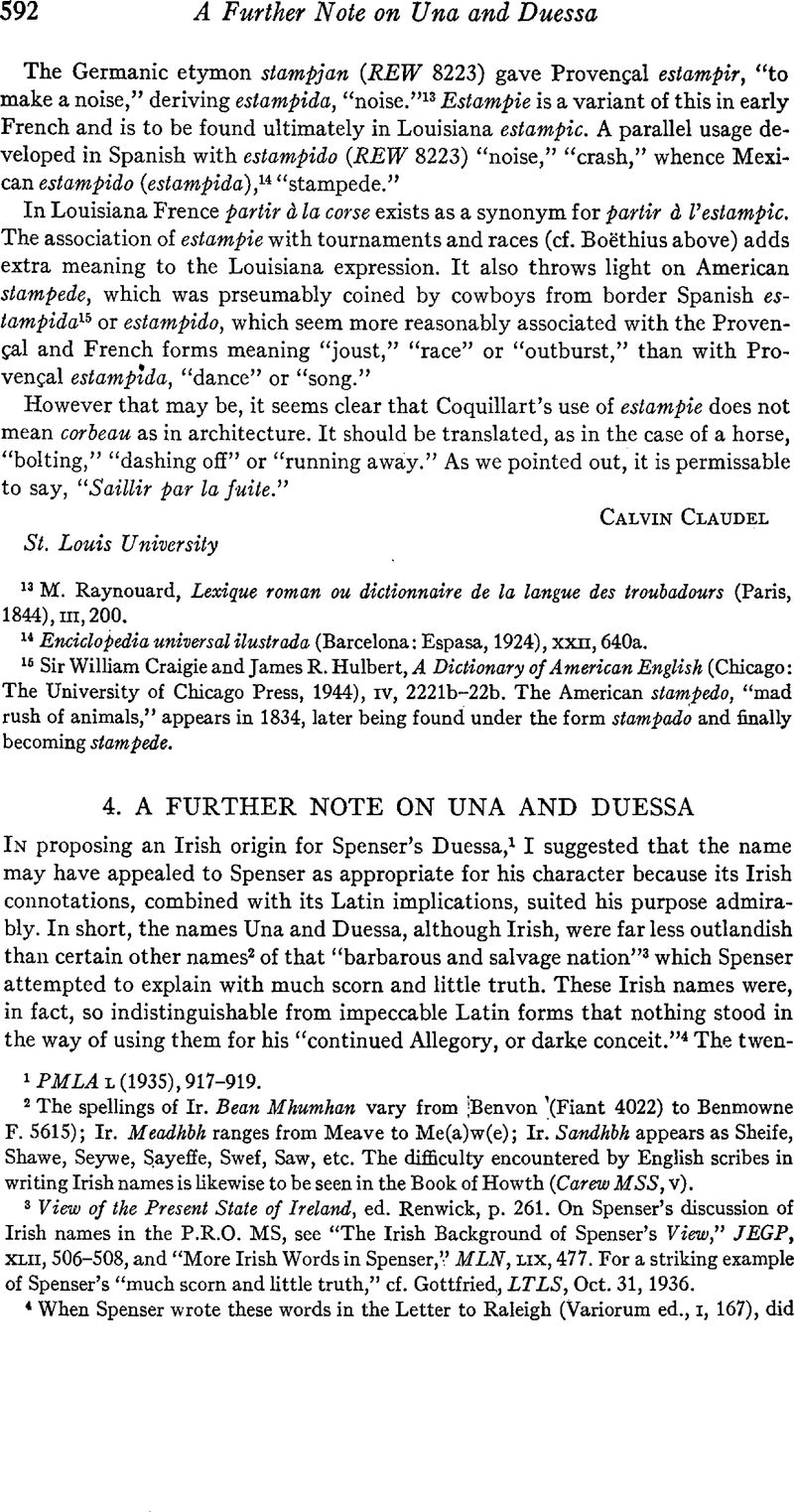No CrossRef data available.
Article contents
A Further Note on Una and Duessa
Published online by Cambridge University Press: 02 December 2020
Abstract

Information
- Type
- Comment and Criticism
- Information
- Copyright
- Copyright © Modern Language Association of America, 1946
References
1 PMLA i. (1935), 917-919.
2 The spellings of Ir. Bean Mhumhan vary from Benvon (Fiant 4022) to Benmowne F. 5615); Ir. Meadhbh ranges from Meave to Me(a)w(e); Ir. Sandhbh appears as Sheife, Shawe, Seywe, Sayeffe, Swef, Saw, etc. The difficulty encountered by English scribes in writing Irish names is likewise to be seen in the Book of Howth (Carew MSS, v).
3 View of the Present State of Ireland, ed. Renwick, p. 261. On Spenser's discussion of Irish names in the P.R.O. MS, see “The Irish Background of Spenser's View,” JEGP, xlii, 506-508, and “More Irish Words in Spenser,” MLN, lix, 477. For a striking example of Spenser's “much scorn and little truth,” cf. Gottfried, LTLS, Oct. 31, 1936.
4 When Spenser wrote these words in the Letter to Raleigh (Variorum ed., i, 167), did he realize, ironically, that much of The Faerie Queene would be obscure to his English readers because of its hidden Irish allusions? Surely, like his master Chaucer, the disciple was capable of having his tongue in his cheek!
5 Topographical Poems of John O'Dubhagain and Giolla na naomh O'Huidrin, Introduction, p. 61.
6 That all these names except Brigit were extremely popular in Spenser's Ireland is attested by their occurrence in the Fiants of Elizabeth.
7 Among them Derbhforgaill, Dorenn, Gormfhlaith, Murrinn, Niamh (spelt Niewffe in F. 6514), Orfhlath, Ranalt. These names were all, to use O'Donovan's phrase, “much metamorphosed” by English writers in the sixteenth century.
8 Cf. “Owny fitz James, spinster, his wife [sic!],” F. 1219. This “Owny” is not to be confused with the old masc. name Uaithne, frequent in the Fiants as “Owney, Ony.” On the place-name Uaithne, see my “Irish Names in The Faerie Queene,” MLN, lxi, 29, footnote 10.
9 “The Influence of Spenser's Kildare Residence on The Faerie Queene,” forthcoming in PMLA.
10 PMLA. l, 917-918.
11 Pedersen, Vergl. Keltische Grammatik, ii, 558-559; with Essa compare particularly the conj. ipf. form -essad. The Dindshenchas poem of Rath Ésa (Metrical Dindshenchas, ed. Gwynn, ii, 2-9) confuses, as Gwynn has pointed out on p. 89, Ésa with Étain: note in this connection the statement in Lane's Larger English-Irish Dictionary, p. 1094: “Etan (sic) was the fabled nurse of the Irish poets.”
12 The latest biography of Spenser, by Professor A. C. Judson, makes good reading and is (to use Milton's phrase) most “timely-happy.” But the picture of “the atmosphere in which Spenser moved” and “his environment” (p. vii) is by no means completely drawn. Judson regards Irenaeus [I retain the traditional spelling], who “evidently represents” Spenser, as the poet's “mouthpiece” (pp. 46, 92) but surprisingly fails to mention Irenaeus' clearly expressed interest in native Irish poetry. “I have caused diverse of [theyr … Poems] to be translated unto me that I might understand them; and surely, they savoured of sweete witt and good invention …” (Globe ed., p. 641 b). For a conjecture on Spenser's “instructor in Irish verse,” see Henley, Spenser in Ireland, p. 103.
13 A century ago O'Donovan, in his monumental edition of the Four Masters, Englished the Irish name Dubhessa in its variant forms invariably as “Duvesa” (see A.D. 1190, 1229, 1328). The usual pronunciation in Ireland among scholars today is “Du-vassa” (Middle-Irish Dubheassa).
14 PMLA, l, 918.
15 The loss, or what amounted to the loss, of bh was not recent in Spenser's time. O'Rahilly (“Notes on Middle-Irish Pronunciation,” Hermathena xliv [1926], 172-173) cites Olechlor (from Ir. O'Leathlobhair) as early as 1292 and ODouyr, Odowyr (from Ir. O'Dubhuidhir) as early as 1304 and 1326.
Among the hundreds of occurrences in the Fiants of Dubhaltach in various English spellings, I have found no single instance of a form such as “Duvaltagh.” By analogy, we should not expect Dubhessa to be pronounced in Spenser's day with a v sound.
16 On the forms of this name see my notes in JEGP, xlv (1946), 19 ff.
17 F.Q., iv, 2.4. That Ferraugh is an Irish name has long been recognized (see the excerpts from Warton and Walker in the Variorum ed., iv, 174-175). In connection with Miss Henley's statement (op. cit., p. 127) that Ferraugh is “a shortened form of a name then common—Feradach” it is interesting to note that the Old-Irish poem on Aillenn (K. Meyer, Hail Brigit: An Old Irish Poem on the Hill of Alenn [sic], Halle and Dublin, 1912) associates Aillenn with a Feradach (stanza 20)—“which Feradach is meant,” comments Meyer, “I do not know. .”
18 Globe ed., p. 632b, has “Farrih,” but two lines later “Fargus, Fergus, or Ferragus.” Renwick's edition, based on MS Rawlinson B, which is less authoritative than Renwick thinks, has “Ferragh” four times and “Farragh” twice, and omits “Fargus.” Which form Spenser actually entered in his manuscript of the View we shall probably never know, nor does it much matter; only the e spelling occurs in P.Q.
19 On Armoy—Fermoy see PMLA, l, 1049.
20 “A Flemish Tradition,” in The Bee, Works of Oliver Goldsmith, ed. Cunningham (London, 1854), iii, 56.
21 See footnote 13 above.
22 Cf. O'Rahilly, art. cit., pp. 193-195. There is no systematic study of Leinster Irish. It is still true, as O'Rahilly observed in 1926 (p. 152), that “very little has as yet been done towards investigating the history of Irish sounds from the twelfth to the sixteenth century.” O'Rahilly has made a substantial beginning in tracing Irish dh and th; bh (as in Dubhessa) and mh (as in Almha) still cry out for the attention of the philologist.

